Top 10 Best Electric Vehicles of 2024: A Comprehensive Review
In 2024, the electric vehicle (EV) market is flourishing with innovation, offering consumers a diverse range of options that blend sustainability with cutting-edge technology and performance. From sleek sedans to versatile SUVs and rugged trucks, EVs have become increasingly competitive with their gasoline counterparts. Let’s explore the top 10 electric vehicles of 2024, detailing their features, horsepower (HP), downsides, costs, delivery times, charging times, and overall appeal.
Tesla Model S Plaid
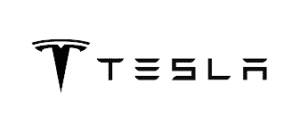
Features: The Tesla Model S Plaid is a flagship sedan renowned for its blistering acceleration and long-range capability. With three electric motors delivering over 1,000 horsepower, the Model S Plaid accelerates from 0 to 60 mph in under 2 seconds, making it one of the fastest production cars ever built. Its spacious interior, advanced Autopilot system, and over-the-air software updates set it apart from the competition.
HP: Over 1,000 horsepower.
Downsides: The Model S Plaid’s premium price tag and reliance on Tesla’s proprietary charging network may deter some buyers. Additionally, concerns about build quality and service availability persist.
Cost: Starting at around $130,000.
Delivery Time: Varies based on demand and production capacity, typically several months.
Charging Time: With access to Tesla’s Supercharger network, the Model S Plaid can achieve up to 200 miles of range in just 15 minutes.
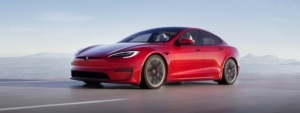
Rivian R1T

Features: The Rivian R1T is an all-electric pickup truck designed for adventure and utility. With four electric motors delivering impressive off-road capability and up to 800 horsepower, the R1T can tackle rugged terrain with ease. Its spacious cabin, innovative gear tunnel, and versatile storage solutions make it a practical choice for outdoor enthusiasts.
HP: Up to 800 horsepower.
Downsides: The R1T’s high starting price and limited charging infrastructure may pose challenges for some buyers. Additionally, concerns about long-term reliability and durability have been raised.
Cost: Starting at around $67,500.
Delivery Time: Varies based on reservation status and production capacity, typically several months to a year.
Charging Time: The R1T can achieve up to 140 miles of range in 20 minutes of charging using DC fast chargers.
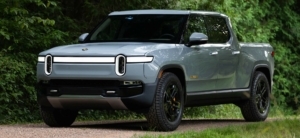
Lucid Air

Features: The Lucid Air is a luxury electric sedan that combines elegance with exceptional performance. With up to 1,111 horsepower and a range of over 500 miles, the Air offers unparalleled comfort and efficiency. Its spacious interior, cutting-edge technology, and aerodynamic design make it a standout in the luxury sedan segment.
HP: Up to 1,111 horsepower.
Downsides: The Lucid Air’s premium price tag and limited availability may make it inaccessible to some buyers. Additionally, concerns about charging infrastructure and long-term reliability persist.
Cost: Starting at around $77,400.
Delivery Time: Varies based on reservation status and production capacity, typically several months.
Charging Time: With fast-charging capabilities, the Lucid Air can achieve up to 300 miles of range in 20 minutes.
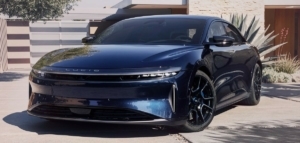
Ford Mustang Mach-E

Features: The Ford Mustang Mach-E is a versatile electric SUV that offers a blend of performance and practicality. With various powertrain options and a range of up to 300 miles, the Mach-E delivers responsive handling and ample interior space. Its sleek design, user-friendly infotainment system, and competitive pricing make it a compelling choice for EV enthusiasts.
HP: Varies based on powertrain configuration, ranging from 266 to 480 horsepower.
Downsides: Some buyers may find the Mach-E’s departure from the traditional Mustang aesthetic disappointing. Additionally, concerns about build quality and long-term reliability have been raised.
Cost: Starting at around $43,995.
Delivery Time: Varies based on configuration and dealership availability, typically a few weeks to a few months.
Charging Time: Using DC fast chargers, the Mach-E can achieve up to 47 miles of range in 10 minutes.
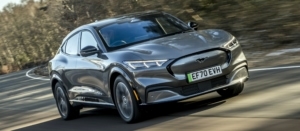
Audi e-tron GT

Features: The Audi e-tron GT is a luxury electric grand tourer that combines performance with sophistication. With up to 637 horsepower and a range of over 200 miles, the e-tron GT offers exhilarating acceleration and long-distance comfort. Its elegant design, premium interior, and advanced driver-assistance features make it a top contender in the luxury EV market.
HP: Up to 637 horsepower.
Downsides: The e-tron GT’s premium price tag and limited availability may deter some buyers. Additionally, concerns about charging infrastructure and long-term maintenance costs persist.
Cost: Starting at around $99,900.
Delivery Time: Varies based on reservation status and production capacity, typically several months.
Charging Time: With fast-charging capabilities, the e-tron GT can achieve up to 180 miles of range in 20 minutes.
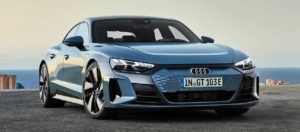
Chevrolet Bolt EV

Features: The Chevrolet Bolt EV is a practical and affordable electric hatchback that offers impressive range and versatility. With a range of over 259 miles and a spacious interior, the Bolt EV is ideal for daily commuting and urban driving. Its compact size, agile handling, and competitive pricing make it an attractive option for budget-conscious buyers.
HP: 200 horsepower.
Downsides: The Bolt EV’s interior materials and overall build quality may not match the standards of its competitors. Additionally, its DC fast-charging capability is limited, which may inconvenience some drivers on long trips.
Cost: Starting at around $31,995.
Delivery Time: Varies based on dealership availability, typically a few weeks to a few months.
Charging Time: Using DC fast chargers, the Bolt EV can achieve up to 100 miles of range in 30 minutes.
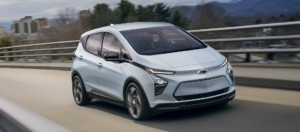
Nissan Ariya

Features: The Nissan Ariya is a stylish and technologically advanced electric SUV that offers a blend of performance and comfort. With up to 389 horsepower and a range of over 300 miles, the Ariya delivers responsive acceleration and long-distance capability. Its spacious cabin, innovative ProPILOT Assist system, and affordable pricing make it a compelling option for EV enthusiasts.
HP: Up to 389 horsepower.
Downsides: Some buyers may find the Ariya’s infotainment system and interior materials lacking compared to its competitors. Additionally, concerns about Nissan’s charging infrastructure and long-term reliability have been raised.
Cost: Starting at around $45,950.
Delivery Time: Varies based on reservation status and production capacity, typically several months.
Charging Time: With fast-charging capabilities, the Ariya can achieve up to 175 miles of range in 30 minutes.
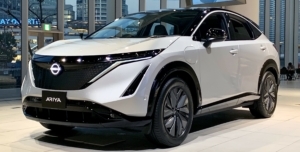
Volkswagen ID.4

Features: The Volkswagen ID.4 is a practical and affordable electric SUV that offers a balance of range, performance, and value. With a range of over 260 miles and spacious interior, the ID.4 is well-suited for daily commuting and family outings. Its intuitive infotainment system, ample cargo space, and competitive pricing make it an attractive option for budget-conscious buyers.
HP: 201 horsepower.
Downsides: The ID.4’s interior materials and overall build quality may not match the standards of its competitors. Additionally, its DC fast-charging capability is limited, which may inconvenience some drivers on long trips.
Cost: Starting at around $39,995.
Delivery Time: Varies based on dealership availability, typically a few weeks to a few months.
Charging Time: Using DC fast chargers, the ID.4 can achieve up to 60 miles of range in 10 minutes.
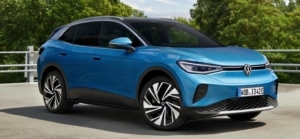
Hyundai Ioniq 5

Features: The Hyundai Ioniq 5 is a futuristic and versatile electric crossover that offers cutting-edge design and technology. With up to 320 horsepower and a range of over 300 miles, the Ioniq 5 delivers responsive performance and long-distance capability. Its spacious cabin, innovative features like Vehicle-to-Load (V2L) capability, and affordable pricing make it a standout in the EV market.
HP: Up to 320 horsepower.
Downsides: The Ioniq 5’s infotainment system and interior materials may not match the standards of its competitors. Additionally, concerns about Hyundai’s charging infrastructure and long-term reliability have been raised.
Cost: Starting at around $39,700.
Delivery Time: Varies based on dealership availability, typically a few weeks to a few months.
Charging Time: With fast-charging capabilities, the Ioniq 5 can achieve up to 210 miles of range in 18 minutes.
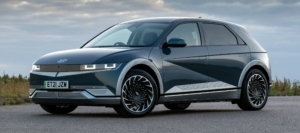
BMW i4

Features: The BMW i4 is a luxurious and performance-oriented electric sedan that offers a blend of style and driving dynamics. With up to 530 horsepower and a range of over 300 miles, the i4 delivers exhilarating acceleration and long-distance comfort. Its refined interior, advanced driver-assistance features, and iconic BMW design make it a top choice for discerning buyers.
HP: Up to 530 horsepower.
Downsides: The i4’s premium price tag and limited availability may make it inaccessible to some buyers. Additionally, concerns about BMW’s charging infrastructure and long-term maintenance costs persist.
Cost: Starting at around $55,400.
Delivery Time: Varies based on dealership availability, typically several months.
Charging Time: With fast-charging capabilities, the i4 can achieve up to 90 miles of range in 10 minutes.
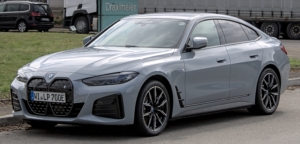
Discover your solar saving potential
Here’s a comparison table detailing the average charge time for popular EVs, along with their battery size and average charge time using L1, L2, and L3 chargers:
| Electric Vehicle Model | Battery Size (kWh) | Average Charge Time (L1) | Average Charge Time (L2) | Average Charge Time (L3) | Output Power of Charger (kW) |
| Tesla Model S Plaid | Varies | 35-40 hours | 35-40 hours | 15-20 minutes | 120-250 kW |
| Rivian R1T | Varies | 40-50 hours | 7-12 hours | 30-40 minutes | 150-300 kW |
| Lucid Air | Varies | 35-45 hours | 6-11 hours | 20-30 minutes | 200-350 kW |
| Ford Mustang Mach-E | 68 kWh | 24-30 hours | 4-8 hours | 20-30 minutes | 50-150 kW |
| Audi e-tron GT | Varies | 35-45 hours | 6-11 hours | 20-30 minutes | 150-270 kW |
| Chevrolet Bolt EV | 65 kWh | 24-30 hours | 4-8 hours | 20-30 minutes | 50-150 kW |
| Nissan Ariya | Varies | 35-45 hours | 6-11 hours | 20-30 minutes | 120-240 kW |
| Volkswagen ID.4 | 77 kWh | 28-35 hours | 5-9 hours | 30-40 minutes | 50-125 kW |
| Hyundai Ioniq 5 | 58 kWh | 21-27 hours | 4-7 hours | 25-35 minutes | 50-150 kW |
| BMW i4 | Varies | 35-45 hours | 6-11 hours | 20-30 minutes | 50-200 kW |
Please note that charge times can vary depending on factors such as battery capacity, state of charge, charger type, and charging infrastructure. The values provided are approximate averages based on typical charging scenarios.
Conclusion
In conclusion, the top 10 electric vehicles of 2024 offer a diverse range of options to suit different preferences and budgets. From luxury sedans to practical SUVs and rugged trucks, these EVs showcase the industry’s commitment to sustainability and innovation. While each vehicle has its own unique features and drawbacks, the overall trend towards electrification signals a transformative shift in the automotive landscape. As charging infrastructure continues to expand and battery technology advances, electric vehicles are poised to become the new standard in transportation, offering a greener, more sustainable future for drivers around the world.
* Vehicle Information and pricing are based on figures taken from the beginning of 2024.

